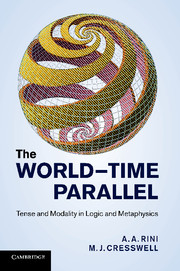Book contents
- Frontmatter
- Contents
- Preface
- Introduction
- PART I TRUTH AND INDEXICALITY
- PART II PREDICATE LOGIC: TENSE AND MODAL
- PART III TIMES AND WORLDS, OR TENSE AND MODALITY?
- PART IV DE RERUM NATURA
- Appendices
- 1 The equivalence of ℒmulti, ℒxtw and ℒi
- 2 Language and metalanguage
- 3 Plantinga's metaphysics
- 4 Interval semantics
- 5 Fatalism and the world–time parallel (with H. Kocurek)
- Bibliography
- Index
1 - The equivalence of ℒmulti, ℒxtw and ℒi
from Appendices
Published online by Cambridge University Press: 05 March 2012
- Frontmatter
- Contents
- Preface
- Introduction
- PART I TRUTH AND INDEXICALITY
- PART II PREDICATE LOGIC: TENSE AND MODAL
- PART III TIMES AND WORLDS, OR TENSE AND MODALITY?
- PART IV DE RERUM NATURA
- Appendices
- 1 The equivalence of ℒmulti, ℒxtw and ℒi
- 2 Language and metalanguage
- 3 Plantinga's metaphysics
- 4 Interval semantics
- 5 Fatalism and the world–time parallel (with H. Kocurek)
- Bibliography
- Index
Summary
In this appendix we state and prove theorems which entail a semantic equivalence between the languages ℒmulti, ℒxtw and ℒi, as defined in Chapter 8 on p. 91. In order to do this we require a formal definition of truth for these languages. It is safest to give this in the style of Chapter 5. Despite the difference between ℒmulti, ℒxtw and ℒi, a model for all these languages has the form 〈W, R, T,<,K, C, D, V〉 as defined on p. 59. The difference comes in how the truth values of wff are obtained. In ℒmulti an assignment μ gives values (from D) only to the individual variables (since these are the only kind of variables in ℒmulti) but, in conjunction with V, determines a truth value Vmulti μ(α) to a wff α of ℒmulti which gives truth values relative to a pair 〈u, s〉 as described on pp. 80 and 82, where u is a sequence of worlds (members of W) and s a sequence of times (members of T). In ℒxtw an assignment μ gives values from D to the individual variables, from W to the world variables, and from T to the temporal variables, but then Vμ just gives truth values relative to worlds and times in the ordinary way. Specifically it works like this. For ℒmulti, where u is a sequence of worlds, s a sequence of times, and μ an assignment, Vmulti μ(α, u, s) denotes the value of α determined by 〈W, R, T, <, K, C, D, V〉 with respect to u, s and μ.
- Type
- Chapter
- Information
- The World-Time ParallelTense and Modality in Logic and Metaphysics, pp. 199 - 214Publisher: Cambridge University PressPrint publication year: 2012



